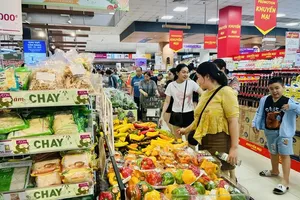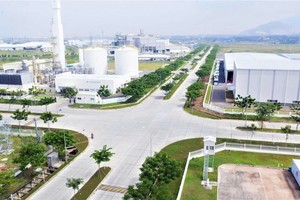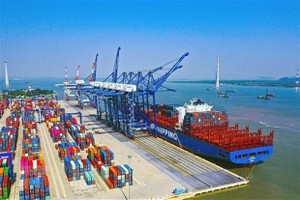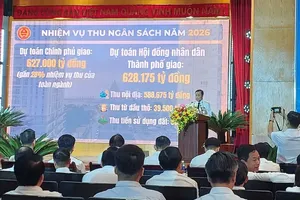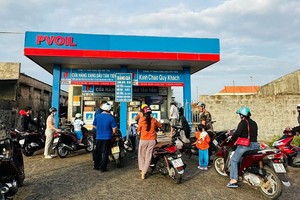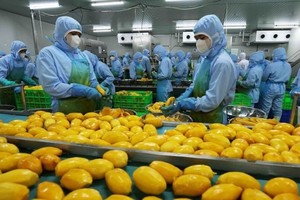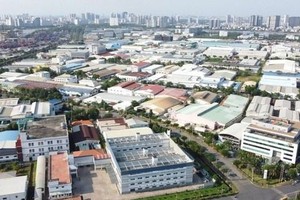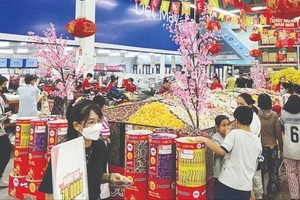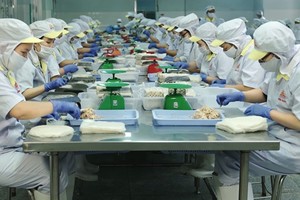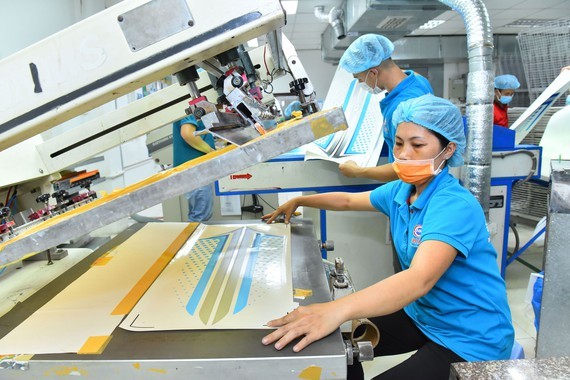
Speaking at the forum, Mr. Nguyen Phuong Dong, Deputy Director of the Department of Industry and Trade of Ho Chi Minh City, said that over the past time, Ho Chi Minh City has synchronously deployed many solutions to support supporting industry enterprises to improve production capacity, including the preferential loan support policy. Accordingly, enterprises expanding and developing production investment projects in the supporting industry sector can receive loans with 50 percent or 100 percent interest rate support. Besides, the approval of loan projects is also widened, with simplified application procedures, helping more enterprises to access stimulus loan packages.
In terms of investment infrastructure, the city has reserved land in industrial zones with locations conveniently connected to the high-tech park to build high-rise factories, combined with land rent reduction, meeting diverse production needs of enterprises in the supporting industry sector. Moreover, the city has invested in building five high-rise factory blocks in the SHTP with a total area of 46,000 square meters and will increase to 162,000 square meters in the coming years for supporting industry enterprises to invest.
However, it must be admitted that the supporting industry products provided by domestic enterprises are only simple products, instead of core products, which have specific characteristics of the end products, so the added-value is not high. Enterprises have participated in the global supply chain but mainly hold low positions, tier 3, or tier 4 suppliers. Besides, domestic enterprises are under high competition pressure from foreign suppliers who shifted their investment into Vietnam. They inherently have more advantages in terms of capital resources, production technology, and product supply. This more or less affects the development ability of domestic enterprises.
In terms of investment infrastructure, the city has reserved land in industrial zones with locations conveniently connected to the high-tech park to build high-rise factories, combined with land rent reduction, meeting diverse production needs of enterprises in the supporting industry sector. Moreover, the city has invested in building five high-rise factory blocks in the SHTP with a total area of 46,000 square meters and will increase to 162,000 square meters in the coming years for supporting industry enterprises to invest.
However, it must be admitted that the supporting industry products provided by domestic enterprises are only simple products, instead of core products, which have specific characteristics of the end products, so the added-value is not high. Enterprises have participated in the global supply chain but mainly hold low positions, tier 3, or tier 4 suppliers. Besides, domestic enterprises are under high competition pressure from foreign suppliers who shifted their investment into Vietnam. They inherently have more advantages in terms of capital resources, production technology, and product supply. This more or less affects the development ability of domestic enterprises.
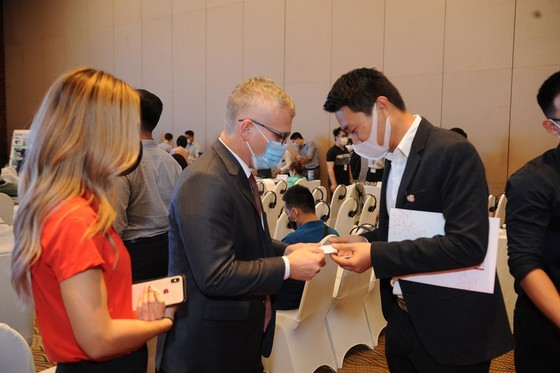 Representatives of Techtronic Industries (TTI) exchange with Vietnamese enterprises to find suppliers of supporting industry products for their factory in Vietnam. (Photo: SGGP)
Representatives of Techtronic Industries (TTI) exchange with Vietnamese enterprises to find suppliers of supporting industry products for their factory in Vietnam. (Photo: SGGP)
Concerning this issue, Mr. Robert Greenan, Deputy Principal Officer of the US Consulate General HCMC, said that the prolonged Covid-19 pandemic had changed the production and business activities of global corporations. According to the current trend, investment activities, including supply chains and FDI enterprises producing end products, are shifting to Vietnam. Therefore, Vietnamese manufacturers need a more flexible transformation to actively seize opportunities to join global supply chains.
Currently, the USAID is cooperating with relevant Vietnamese authorities to implement the USAID Linkages for Small and Medium-sized Enterprises project to increase the ability to connect Vietnamese enterprises with those in the supply chain. This is a part of the US Government's effort to create market access opportunities, increase competitiveness, and especially, promote trade cooperation between enterprises of the two countries. Earlier, in September this year, this agency coordinated with local authorities to organize a conference to connect supply and demand of supporting industry products in HCMC, attracting the participation of nearly 200 domestic and foreign enterprises. Around 117 business linkages have been established between FDI enterprises producing end products with Vietnamese suppliers.
Ms. Le Bich Loan, Deputy Head of the Management Board of SHTP, said that along with strengthening the capacity to supply supporting industry products for domestic enterprises, the management board is accelerating investment attraction of FDI enterprises producing end products. It helps to expand on-spot exporting possibilities for domestic manufacturers, reducing the risk caused by a global supply chain breakdown due to the prolonged Covid-19 pandemic.
According to Ms. Loan, currently, preferential policies to attract investment in the SHTP have been completed. Specifically, the projects will enjoy corporate income tax incentives of 10 percent for 15 years. In which, they will receive tax exemption for four years and a reduction of 50 percent in tax payable in the next nine years. Besides, enterprises will also be exempt from import tariffs on imported goods to create fixed assets, raw materials, supplies, and components to implement investment projects. As for land rent, projects will be exempted or reduced in land rent following the regulations suitable for each case. Moreover, investors are also entitled to preferential loan interest rates under the investment stimulus program.
Many FDI enterprises participating in the forum also agreed that the investment environment in HCMC in particular and Vietnam, in general, is quite attractive. Not only tax incentives but good control on Covid-19, stable socio-political situation, and relatively competitive labor costs compared to other countries in the region have also helped the investment environment of Vietnam to get scores.
However, it must also be seen that to speed up the production of FDI enterprises producing end products, in general, the Vietnamese authorities need to accelerate the investment approval process for the construction of factories. Procedures for importing raw materials and production technology must also be reformed towards simplicity and convenience for enterprises. As for Vietnamese enterprises supplying supporting industry products, it is essential for them to proactively cooperate with FDI end-product manufacturers to quickly access financial funds, and at the same time receive support to improve production capacity, provide products with high value, solve the supply of raw materials, and more importantly, approach and absorb new technologies in production. Vietnamese enterprises themselves also need to proactively ensure quality standards, on-time delivery, improve corporate governance capacity, and be willing to continuously upgrade production lines to meet the increasing demand of FDI enterprises manufacturing end products.
Currently, the USAID is cooperating with relevant Vietnamese authorities to implement the USAID Linkages for Small and Medium-sized Enterprises project to increase the ability to connect Vietnamese enterprises with those in the supply chain. This is a part of the US Government's effort to create market access opportunities, increase competitiveness, and especially, promote trade cooperation between enterprises of the two countries. Earlier, in September this year, this agency coordinated with local authorities to organize a conference to connect supply and demand of supporting industry products in HCMC, attracting the participation of nearly 200 domestic and foreign enterprises. Around 117 business linkages have been established between FDI enterprises producing end products with Vietnamese suppliers.
Ms. Le Bich Loan, Deputy Head of the Management Board of SHTP, said that along with strengthening the capacity to supply supporting industry products for domestic enterprises, the management board is accelerating investment attraction of FDI enterprises producing end products. It helps to expand on-spot exporting possibilities for domestic manufacturers, reducing the risk caused by a global supply chain breakdown due to the prolonged Covid-19 pandemic.
According to Ms. Loan, currently, preferential policies to attract investment in the SHTP have been completed. Specifically, the projects will enjoy corporate income tax incentives of 10 percent for 15 years. In which, they will receive tax exemption for four years and a reduction of 50 percent in tax payable in the next nine years. Besides, enterprises will also be exempt from import tariffs on imported goods to create fixed assets, raw materials, supplies, and components to implement investment projects. As for land rent, projects will be exempted or reduced in land rent following the regulations suitable for each case. Moreover, investors are also entitled to preferential loan interest rates under the investment stimulus program.
Many FDI enterprises participating in the forum also agreed that the investment environment in HCMC in particular and Vietnam, in general, is quite attractive. Not only tax incentives but good control on Covid-19, stable socio-political situation, and relatively competitive labor costs compared to other countries in the region have also helped the investment environment of Vietnam to get scores.
However, it must also be seen that to speed up the production of FDI enterprises producing end products, in general, the Vietnamese authorities need to accelerate the investment approval process for the construction of factories. Procedures for importing raw materials and production technology must also be reformed towards simplicity and convenience for enterprises. As for Vietnamese enterprises supplying supporting industry products, it is essential for them to proactively cooperate with FDI end-product manufacturers to quickly access financial funds, and at the same time receive support to improve production capacity, provide products with high value, solve the supply of raw materials, and more importantly, approach and absorb new technologies in production. Vietnamese enterprises themselves also need to proactively ensure quality standards, on-time delivery, improve corporate governance capacity, and be willing to continuously upgrade production lines to meet the increasing demand of FDI enterprises manufacturing end products.
Mr. Jeff Nessim from Techtronic Industries (TTI) said that the company is moving its factory from North America to Asia. From the end of last year, the company has spent US$650 million to invest in the construction of a manufacturing plant and a product research and development center in SHTP. The main products that the company determines to manufacture in Vietnam are hand tools. Currently, the export turnover of the factory in Vietnam has increased from $300 million at the end of last year to $1.5 billion by the end of this year and is expected to reach $6 billion by 2025. The company also aims to increase the supply rate of supporting industry products in Vietnam to 80 percent in the coming time.
